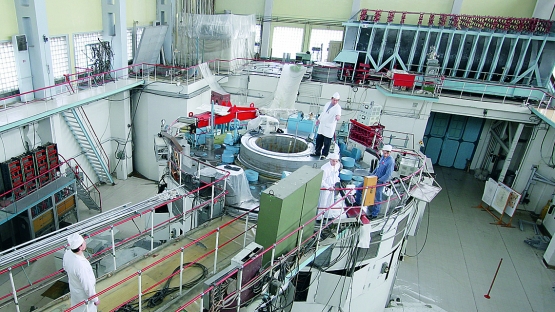Kazakhstan’s Institute of Nuclear Physics has implemented significant modifications and upgrades to improve the safety of its research reactor, concluded experts of an IAEA Integrated Nuclear Safety Assessment of Research Reactors (INSARR) mission last week. The IAEA team reviewed the comprehensive safety programmes at the light water reactor called WWR-K, including improvements to reactor safety systems and to the training and qualification programme for staff.
“The research reactor is now starting a new life after major modifications and refurbishment including conversion from the use of high-enriched uranium (HEU) to low-enriched uranium (LEU) to further serve science and the national economy,” said Yergazy Kenzhin, General Director of Kazakhstan’s Institute of Nuclear Physics. The recommendations provided by the IAEA review mission will help to ensure further continuous safety improvements, he added.
The reactor is located at Alatau, near the commercial capital of Almaty. The 6 MW reactor is used for the production of medical and industrial radioisotopes, scientific research and testing nuclear materials for industrial use.
The reactor was commissioned in 1967, when HEU fuel was typically used to conduct scientific experiments. In order to decrease proliferation risks while doubling the reactor’s utilization capacity, the programme to convert WWR-K to LEU commenced in 2008 with the repatriation of spent HEU fuel. The WWR-K was shut down in 2015 to implement a number of modifications at the reactor to allow for the conversion, which was completed in 2016.
“The IAEA peer review team noted the implementation of recommendations of the previous INSARR mission in 2008, including those related to management system, training and qualification of personnel, and radiation protection,” said Team Leader David Sears. He added that additional recommendations on safety analysis, ageing management, safety of experiments and emergency preparedness were provided during this mission.
The mission conducted at the WWR-K research reactor took place from 27 February to 3 March 2017. The mission team was composed of international nuclear safety experts from three countries that operate research reactors and IAEA staff.
INSARR is a peer review mission to assess and evaluate safety of research reactors and is conducted on the basis of the IAEA Safety Standards. Research reactors are nuclear installations used for research, education and training, testing materials or the production of radioisotopes for medicine and industry.






